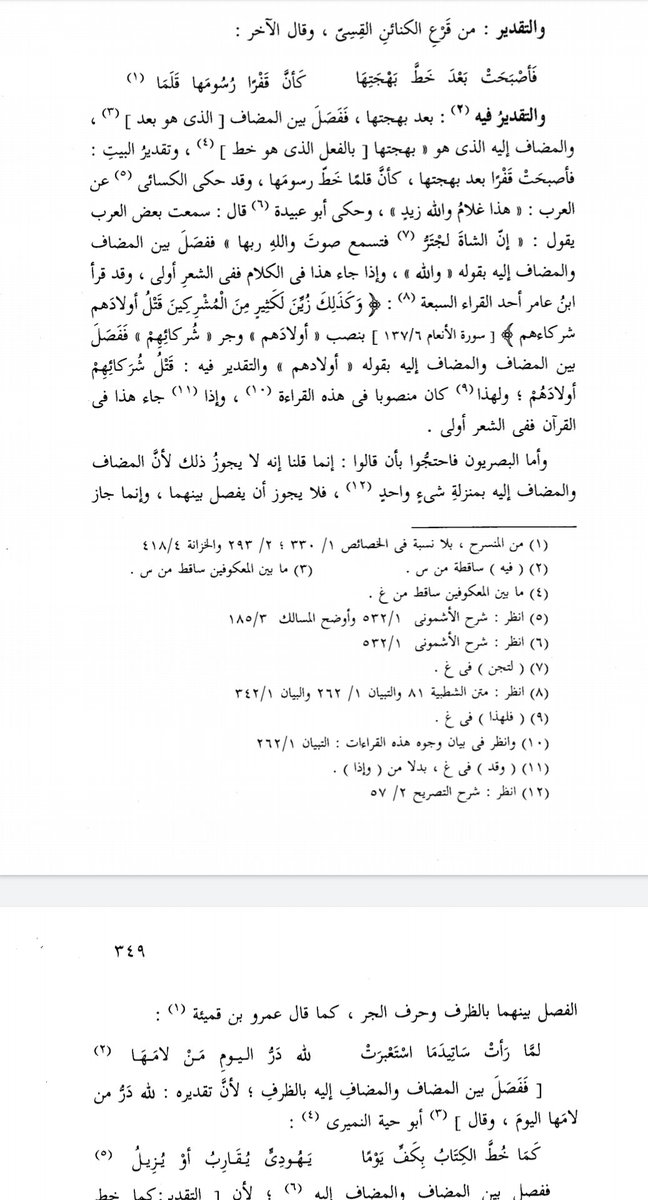Were the differences between the Uthmanic mushafs "scribal errors"?
First, I don& #39;t like using the term "errors" when discussing a divine text such as the Qur& #39;an.
Second, I think these differences can be grouped according to the nature of of these differences.
First, I don& #39;t like using the term "errors" when discussing a divine text such as the Qur& #39;an.
Second, I think these differences can be grouped according to the nature of of these differences.
1- This group is related to different Arabic dialects: such as (يرتد - يرتدد) and (تأمروني - تأمرونني) etc.
These are considered to valid readings under the license of the seven ahruf regardless of the issue of whether or not the sahabah intended one reading or both readings.
These are considered to valid readings under the license of the seven ahruf regardless of the issue of whether or not the sahabah intended one reading or both readings.
Therefore, to say that these differences are
"errors" is inappropriate.
We can argue all day about whether or not the sahabah intended to insert these differences in the Uthmanic codex. However, this doesn& #39;t change the fact that these readings are still valid.
"errors" is inappropriate.
We can argue all day about whether or not the sahabah intended to insert these differences in the Uthmanic codex. However, this doesn& #39;t change the fact that these readings are still valid.
2. The second group of differences is related to إعراب such as the reading of ابن عامر = شركائهم
Some Arabic grammarians, and some scholars of tafsir and qir& #39;aat didn& #39;t like this reading. Some were very explicit that this reading is wrong from a grammatical point of view, while others only showed some signs of dissatisfaction.
Many other scholars responded to allegations by discussing shawahid من كلام العرب = for example,
الإنصاف في مساىٔل الخلاف، لابن الأنباري:
الإنصاف في مساىٔل الخلاف، لابن الأنباري:
3. This group is related to the actual wording of the Qur& #39;anic text (addition or omission). For example,
سارعوا - (و)سارعوا
تحتها - (من) تحتها
وتوكل - (ف)توكل
سارعوا - (و)سارعوا
تحتها - (من) تحتها
وتوكل - (ف)توكل
These differences are not easy to explain. However, In order to prove these differences were "scribal errors", one would have to prove the following:
1. That these differences are definitely not intentional
2. That these readings didn& #39;t exist before the Uthmanic standardization.
1. That these differences are definitely not intentional
2. That these readings didn& #39;t exist before the Uthmanic standardization.
Still discussing the third group.
We know they used two spellings of the name of the prophet =
إبراهيم - إبرهم
They used these 2 spellings within the same mushaf.
We know they used two spellings of the name of the prophet =
إبراهيم - إبرهم
They used these 2 spellings within the same mushaf.
Based on the excellent paper by @PhDniX, I think saying that they did it intentionally to accommodate the 2 readings is not fictional.
The sahabah did not see that as an issue even within the same mushaf.
The sahabah did not see that as an issue even within the same mushaf.
Perhaps the same thing can be said about the differences in, for example
(و) سارعوا
It& #39;s either they insert the differences in all the mushafs or they divide between the mushafs. They went with the second option since it was the most convenient for them.
(و) سارعوا
It& #39;s either they insert the differences in all the mushafs or they divide between the mushafs. They went with the second option since it was the most convenient for them.
Probably some Muslims are shocked now by the fact that even some Muslim researchers are of the opinion that the differences between the Uthmanic mushafs are best explained as "scribal errors".
Let& #39;s assume that the scribes intended one reading and ended up writing a different one.
We can use the example of 2: 116 =
(و)قالوا
So let& #39;s assume that the scribes intended to write this word with waw in all mushafs.
We can use the example of 2: 116 =
(و)قالوا
So let& #39;s assume that the scribes intended to write this word with waw in all mushafs.
However, they made a "mistake" by omitting the waw from the Syrian mushaf.
Please keep in mind the following:
1. There are only a few differences which belong to the third category.
2. Overall, these differences are insignificant.
Please keep in mind the following:
1. There are only a few differences which belong to the third category.
2. Overall, these differences are insignificant.

 Read on Twitter
Read on Twitter


